

Vimshottari Dasha - Rashi - Gochara - Bhava - Graha - Ratna - Nakshatra - Amsha - Karaka - Varga - Bala
- Traditional Jyotishavidya Sacred Jewels Ratna for Shukra
- Sweet-seeking Shukra reaches maturity = age 25
- [energizing-identifying lagnesha for Urisha indriya-lagna]
- [energizing-identifying lagnesha for Tulā indriya-lagna]
- BPHS Vimshottari Dasha of Shukra
- BP Lama commentary Shukra-Mahadasha
Shukra occupies 9th-from-Chandra
- [Shukra-Mesha]
- [Shukra-Urisha] = [svakshetra]
- [Shukra-Mithuna]
- [Shukra-Karkata]
- [Shukra-Singha]
- [Shukra-Kanya] = [nīcha]
- [Shukra-Vanika] = [svakshetra] + [mūlatrikoṇa if within 1-10 deg]
- [Shukra-Vṛścika]
- [Shukra-Dhanus]
- [Shukra-Makara-Draco]
- [Shukra-Kumbha]
- [Shukra-Meena ] = [uchcha]
- [Shukra in bhava-1]
- [Shukra in bhava-2] = [svabhava]
- [Shukra in bhava-3]
- [Shukra in bhava-4] = [dikbala]
- [Shukra in bhava-5]
- [Shukra in bhava-6]
- [Shukra in bhava-7] = [svabhava]
- [Shukra in bhava-8]
- [Shukra in bhava-9]
- [Shukra in bhava-10]
- [Shukra in bhava-11]
- [Shukra in bhava-12]
OM shum Shukra ya namah
OM dram drim draum sah Shukra ya namah
Himkundmrinaalaabham Daityaanam Paramam Gurum
Sarvashastrapravaktaram Bhargavam Pranmaamyaham
शुक्र śukra / शुक्ल śukla
Professor Shukra
सित sita = white color, pale, lustrous
भृगुज bhṛgu Bhrigu = the bright one
षोडशार्चिस् ṣoḍaś-ārcis = 16-rayed
दैत्यगुरु daitya-guru / असुरगुरु asura-guru
= grower of demons
occupies
धर्म dharma = right, nature , character
पितृ pitṛ pittrü = father, forefather
चित्त citta chitta = thought, intelligence
गुरु guru = growth
आचार्य ācārya = teacher
Venus - Venera
Freya - Frigg
Zuhra - Ishtara Ashatarra Aphrodite
Phosphoros - Heosphoros
Lucipheros [Lucifer] = bringer of light
Morgensteorra - Aefensteorra
Vesper - Mathusias - Athena - Dianna - Inanna - Nin-si-anna
Nogah - Ba'ah - Seba-djai - Delebat - Jingxing
resides in
the ninth house
iter
dharma-sthāna
svabhava of Brihaspati
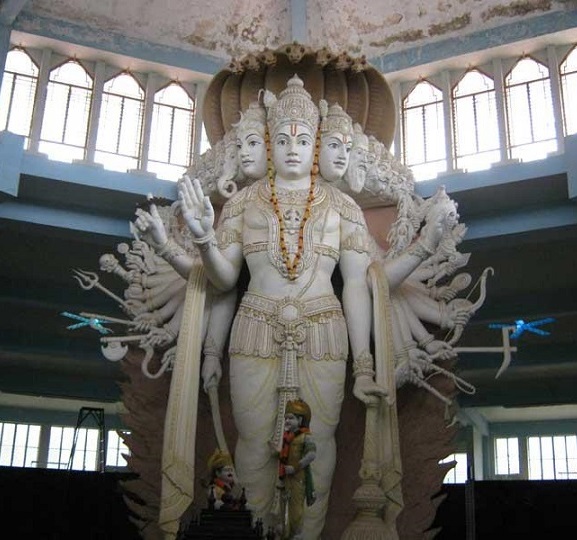
Thousand-armed Shri Vishnu of Nela-mangala (near Bangalore)

Baha'i Temple in Wilmette, Illinois, north of Chicago
QUOTATION Das commentary ,
-
IF Venus is in 9
-
and Venus is in Gemini
-
or Venus is in Scorpio.
"This placement tends to indicate that you will acquire much wealth by the end of your life."
- IF Venus is in 9,
and Venus is in Aries
- or Venus is in Gemini
- or Venus is in Leonis
- or Venus is in Libra
- or Venus is in Sagittarius.
"A charming and comely partner,
no interest in the world and little desire for children.
Skill in music, art, drama and fine arts.
Natural in acting."
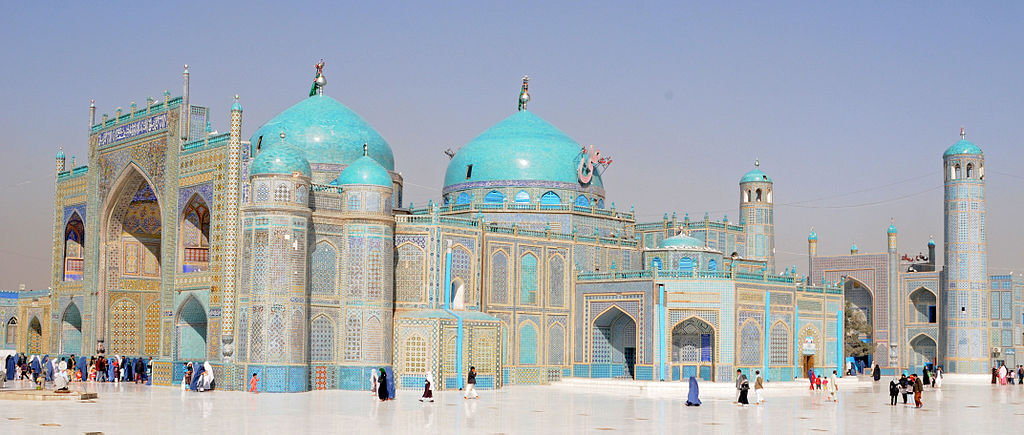
Masjid Sultan Ahmed
Mazar-e-Sharif, Balkh Province, Afghanistan
EXAMPLES
[busy-collaborative sahaja-pati for Simha indriya-lagna] [dutiful-executive karmesha for Simha indriya-lagna]
-
check Kuja + Kuja-drishti to source Shukra's competitive bargaining, innovative diplomacy, kinetic attractions
doctrinal, philosophical, global harmony
-
Old Time Music 1929-2003 comedy June Carter Cash [arranging-bargaining Bharani-3] + [Bharani-Shukra-yuti-Rahu-Bharani]
***
-
Gitanjali 1861-1941 lyrical poet Rabindranath Tagore [mysterious-revelatory Bharani-4] + [Bharani-Shukra-yuti-Surya- Bharani-uchcha] + [Bharani-Shukra-yuti-Budha-Aśvini]
-
The Tower 1865-1939 Symbolist poetry William Butler Yeats [brokering-arranging Bharani-3] + [Bharani-Shukra-yuti-Ketu-Aśvini]
-
My Fair Lady 1908-1990 musical theatre Rex Harrison [dominating-innovative Aśvini-1] = [vargottamsha] + [Bharani-Kuja-yuti-Chandra-Aśvini] + [Bharani-Kuja-yuti-Shukra-Aśvini] [9, celebrity, priesthood, patronage, ceremony, worldview]
-
Layla 1945- guitarist Eric Clapton [collaborative-managing Aśvini-3] + [Aśvini-Shukra-yuti-Budha-Aśvini]
[Shukra-Urisha] = [svakshetra]
[acquisitive-sensual dhana-pati for Kanya indriya-lagna] [doctrinal-philosophical dharmesha for Kanya indriya-lagna]
-
Prodigals 1920-2007 writer-illustrator Ruth Bell Graham [managing-explaining Rohiṇī-3] + [Mriga-Surya-yuti-Shukra-Rohiṇī ]
***
-
England-King 1491-1547 Henry-8-Tudor [financial-evaluating Rohiṇī-2] = [vargottamsha] + [Rohiṇī-Shukra-yuti-Ketu-Rohiṇī]
-
Turtle Island 1930- poet environmentalist Gary Snyder [publishing-explaining Rohiṇī-3] + [Rohiṇī-Shukra-yuti-Budha-Kṛttikā] + [Rohiṇī-Shukra-yuti-Guru-Mriga]
[personalized lagnesha philosophically gracious conversational diplomacy] [enjoys talking about global topics] [international equity discussions seek balanced agreement]
- check Budha + Budha-drishti to source Shukra's mercantile agreements, explanatory contracts, informative advising
[smooth gestures confer hidden patronage] [identified with lagnesha occluded randhresha financial bargaining] [courteously explains occult sacerdotal arrangements]
[skillfully delivered doctrinal messaging for sangha believers] [taste for ideologically transformative randhresha process] [aesthetic of philosophical description]
[pleasantly communicative father may be wise merchant , chatty patriarch, undisclosing randhresha patron of the handcrafting arts]
-
POTUS-23 National Forests 1833-1901 Benjamin Harrison [champion-pioneer Punarvasu-1] + [Puna-Shukra-yuti-Rahu-Puna]
-
Italy-Dictator 1883-1945 Fascist Benito Mussolini [announcing-managing Punarvasu-3] = [ātmakāraka] + [Punarvasu-Shukra-yuti-Guru-Punarvasu]
***
-
Wizard of Oz 1922-1969 entertainer Judy Garland [cinema-lyrics Punarvasu-3] = [ātmakāraka] = [vargottamsha] + [Puna-Shukra-yuti-Budha-Arudha]
-
VPOTUS-pair Music Censorship 1948- Tipper Gore [imaginative-charitable Arudra-4] = [navamsha Shukra-Meena -uchcha]
[balancing-bargaining jaya-pati for Vṛścika indriya-lagna] [contemplative-isolating vyaya-pati for Vṛścika indriya-lagna]
-
check Chandra + Chandra-drishti to source Shukra's undulating harmonies, familiar reciprocity, soothing arrangements
[sweetly sheltering ancestral diplomacy jaya-pati] [enjoys a worldview based in ancient wisdom] [values the promise of security toward global harmony]
[seeks ethno-national protection within balanced agreements on international equity] [smooth cultural exchanges confer invisible vyaya-pati patronage] [believes in graciously rhythmic dance of negotiation]
[courteously follows habitual sacerdotal arrangements] [familiar rituals guide doctrinal understanding] [prefers the stability of parental philosophical roles]
[sustains the established moral beliefs] [aesthetic of clannish priestly weltanschung] [pleasantly preachy patriarchal father may live a routinized farm-or-marine life]
-
UK-Princess Royal 1950- equestrienne Anne Windsor Laurence [ceremonial-displaying Pushya-1] + [Aśleṣa-Surya-yuti-Shukra-Pushya]
***
-
POTUS-27 Dollar Diplomacy 1857-1930 William Howard Taft [network-revenues Aśleṣā-3] + [Pushya-Shani-yuti-Shukra-Aśleṣā]
[inimical-medicating rogesha for Dhanus - Haya indriya-lagna] [friendly-gainful labha-pati for Dhanus - Haya indriya-lagna]
-
check Surya + Surya-drishti to source Shukra's glittering advocacy, dramatized bargains, self-central arrangements
[Dhanayoga = Surya rules-11 + occupies 11th-from-11]
[doctrinal values, believes in contracts, global arrangements-regally optimistic relationships, imbalanced financial dealings, entitled philosophical views about pleasure
-
Macedon-King o-Megos 356-323 BCE Alexander-III [financial-heritage Magha-2] + [Magha-Surya-yuti-Ketu-Magha]
-
India-PM 1944-1991 Rajivaratna Gandhi [calculating-analytical Pūrvaphalgunī-2] = [navamsha Shukra-Kanya-nīcha] + [Yoni-Shukra-yuti-Surya-Magha] + [Yoni-Shukra-yuti-Chandra-Yoni] + [Yoni-Shukra-yuti-Budha-Aryaman] + [Yoni-Shukra-yuti-Guru-Magha]
***
-
Law of One 1943-2015 Ra Material Carla Rueckert [celebratory-dramatic Pūrvaphalgunī-1] = [vargottamsha]
[Shukra-Kanya] = [nīcha] = [potentially nīcha-bhanga if yuti Budha-Kanya]
[Yogakaraka displaying-creative vidya-pati for Makara - Draco indriya-lagna]
[Yogakaraka dutiful-exective karmesha for Makara - Draco indriya-lagna]
[preaches on applied equity through service ministry] [balanced argumentative exegesis of sacred teachings] [enjoys bright display vidya-pati of principled understanding of global injustice]
[may prefer professorship to organizational leadership due to karmesha in 12th-from-10] [despite intending to help the beneficiary, patronage relationships may end in betrayal] [political fortunes aided by vidya-pati in 5th-from-5]
[may be attracted into exploitive international bargains] [may offer medical help to disadvantaged worldwide populations] [sisterly-figures may be respected karmesha yet mistreated philosopher]
-
Secret Doctrine 1831-1891 Theosophy Helena Hahn Blavatsky [champion-challenger Hasta-1] [nīcha-Hasta-Shukra-yuti-Chandra-Chitra]
***
-
POTUS-42 My Life 1946- Bill Clinton [collaborative-mercantile Hasta-3] + [nīcha-Hasta-Shukra-yuti-Mangala-Hasta]
= [svakshetra] + [mūlatrikoṇa if within 0-10 deg]
[Yogakaraka homebound-anchoring bandesha for Kumbha indriya-lagna]
[Yogakaraka doctrinal-worldviewing dharmesha for Kumbha indriya-lagna]
[sweetly negotiating diplomacy jaya-pati] [enjoys a worldview based in convenantal wisdom dharmesha] [values the promise of equity toward global harmony]
[seeks balanced agreements on tenets of belief] [smooth bargaining exchanges confer routine bandesha patronage] [principled gracious middleman priesthood]
[courteously follows brokered sacerdotal arrangements] [fair relationships guide doctrinal understanding] [prefers non-confrontational ethno-religious bandesha faith]
[represents trust in the contract] [aesthetic of mediating priestly weltanschung] [pleasantly preachy patriarchal dharmesha father may form alliances within his farm-or-marine bandesha settlement]
[for husbandly Learners, wifely-companion may be suave indoctrinator, peaceable professor, closely aligned with her father's dogma]
-
Hour of Decision 1918-2018 Rev. Billy Graham [fantasizing-guided Arcturus-4] = [navamsha Shukra-Meena -uchcha] + [nīcha-Viśākha -Surya-yuti-Shukra-Svati]
[busy-collaborative sahaja-pati for Meena - Antya indriya-lagna] [mysterious-discovering randhresha for Meena - Antya indriya-lagna]
-
check Mangala + Mangala-drishti to source Shukra's penetrating brokerage, evolutionary alliances, taboo-challenging partnership intensity
transformative healing aesthetic
-
Foursquare Evangelist 1890-1944 Aimee Semple McPherson [ministering-logistical Anuradha-2] = [navamsha Shukra-Kanya-nīcha] + [Maitra-Shukra-yuti-Ketu-Jyeṣṭha]
-
On Golden Pond 1937- drama-commerce Jane Seymour Fonda [systematic-populist Jyeṣṭha-3] = [ātmakāraka] + [Jyeṣṭha-Shukra-yuti-Rahu-Maitra] [9, father, patronage, principled beliefs]
[banking-conserving dhana-pati for Mesha indriya-lagna] [bargaining-balancing jaya-pati for Mesha indriya-lagna]
-
check Guru + Guru-drishti to source Shukra's generously agreeable, optimisticly accommodating, globalist aesthetic
[sweetly humanistic diplomacy jaya-pati] [enjoys worldview based in sacred wisdom] [values the promise jaya-pati of global-wide harmony]
[seeks financial dhana-pati agreements based on tenets of shared belief] [smooth bargaining jaya-pati exchanges confer enriching dhana-pati patronage] [principled gracious priestly middleman]
[courteously follows brokered sacerdotal arrangements] [doctrinally-guided relationships develop philosophical understanding] [prefers non-confrontational balanced expressions of catchetical faith]
[represents trust in the credenda] [aesthetic of mediating ideological weltanschung]
[preachy patriarchal father may form alliances jaya-pati via assets or stored values dhana-pati] [father may be optimistic money broker, international deal-maker, holder of permissive convictions]
[for husbandly Learners, wifely-companion may be suave indoctrinator, peaceable professor of theory, aligned with her father's dogma]
-
POTUS-25 Gold Standard 1843-1901 William McKinley [financial-evaluating Mūla-2] + [Mūla-Shukra-yuti-Shani-Uttarāṣāḍha] + [Mūla-Shukra-yuti-Rahu-Pūrvāṣāḍhā]
-
VPOTUS Military Weapons Contracts 1941-2025 Dick Cheney [ideological-dogmatic Uttarāṣāḍha-1] = [vargottamsha] = [ātmakāraka]
-
Apple Computer 1955-2011 Steve Jobs [preaching-principled Uttarāṣāḍha-1] = [vargottamsha] + [Vaishva-Shukra-yuti-Rahu-Mūla]
[energizing-identifying lagnesha for Urisha indriya-lagna] [inimical-unbalanced rogesha for Urisha indriya-lagna]
-
check Shani + Shani-drishti to source Shukra's architectural beauty, structured values, class-conscious aesthetic
[sweetly class-conscious complaints rogesha] [enjoys strict hierarchical worldview] [identified lagnesha with global-wide harmonious social regulation]
[seeks personalized lagnesha agreements based on tenets of shared materialistic understanding] [smooth bargaining exchanges confer normalizing social-status] [principled gracious publicly-approved middleman]
[courteously follows brokered formalized arrangements] [legally structured relationships develop respected rank] [prefers to maintain peaceable balanced dignified positions]
[represents trust in conventional credenda] [weltanschung aesthetic of mediating lawful arrangements] [may develop conflicted rogesha contractual partnerships, due to misaligned doctrinal rigidity]
[patriarchalist father may form illicit rogesha alliances while his public reputation stays orderly] [father may be honored money broker, structured deal-maker, holder of realistic convictions]
[for husbandly Learners, wifely-companion may have suavely elegant appearance, reputation for longevity in university or public guidance roles, alignment with her father's profession]
-
USA-Sen-Utah 1947- finance Mitt Romney [financial-evaluating Śrāvaṇa-2]
-
Moneyball 1963- drama-commerce Brad Pitt [orderly-hierarchical Uttarāṣāḍha-2] = [vargottamsha] + + [Uttarāṣāḍha-Shukra-yuti-Chandra-Uttarāṣāḍha] + [Uttarāṣāḍha-Shukra-yuti-Shani-Dhaniṣṭha]
[witty-creative vidya-pati for Mithuna indriya-lagna] [contemplative-retreating vyaya-pati for Mithuna indriya-lagna]
-
check Shani + Shani-drishti to source Shukra's pleasantly populist, smoothly interconnected, gracefully associative advocacy
networked aesthetic
-
POTUS-40 American Life 1911-2004 Ronald Reagan [governing-regulatory Vāruṇa-2]
-
Be Here Now 1931-2019 Baba Ram Dass [populist-connecting Vāruṇa-3] = [vargottamsha]
[Shukra-Meena ] = [uchcha]
[homebound-anchoring bandesha for Karkata indriya-lagna] [friendly-gainful vriddhi-pati for Karkata indriya-lagna]
-
check Guru + Guru-drishti to source Shukra's dreamlike attractions, contemplative balance, symbolic relationships
[Dhanayoga = uchcha dhanakaraka ruler of 11 occupies 11th-from-11]
-
El Castilo Interior 1515-1582 St. Teresa de Avila [deal-making Andromeda-3] + [uchcha-Andromeda-Shukra-yuti-Surya-Revatī] + [uchcha-Andromeda-Shukra-yuti-Budha-Revatī-nīcha-bhaṅga] ++ + [Shukra-9 parivartamsha Guru-11]
***
-
POTUS-04 USA-Constitution 1751-1836 James Madison [governing-organizational Revatī-2] + [uchcha-Revatī-Shukra-yuti-Surya-Uttarabadra]
 smoothing
SHUKRA occupies DHARMA-STHANA
smoothing
SHUKRA occupies DHARMA-STHANA
aesthetic theory
luxury beliefs
philosophical harmony
ideological arrangements
appreciation of sacred doctrine
preference for humanistic, university-global, philosophical relationships
[9-philanthropy, patronage, credenda]
Shukra in expansive Guru's natural sthāna appreciates the liturgical and literary expressions of ceremonial religion, public priesthood, and wisdom-teachings.
Often, aspecial valuation for religious art.
Sweet-seeking Shukra delights in the glamorous world of high temple discourse and public worship, such as
- consecrations
- weddings
- religious vows
- university investiture
- graduations
sanctification of state power such as
- swearing-in vows for investiture of public office.
Enjoys wisdom, world travel, philosophical relationships
Luxurious pleasures via
scholarship, holy scripture and liturgies, religious art and music, spiritual discussions, global travel for education, university and temple culture, divine knowledge
Appreciates the value of religion as a development of culture
Adores the most beautifully decorated sacred space and temple costumes, sacred art and sacred music , the fragrance of billowing incense, the flash of bright silks in shows of Divine pomp and circumstance. The more elaborately designed the ritual, the better.
Enjoys relationship with professors, universities, travel guides, priests and temples.
-
Where will one meet the marriage-partner?
-
In the university or temple, during a liturgy or high ceremony, or during world travels.
dhana-karaka Shukra in a svabhava of Guru can produce a great deal of wealth, but often this wealth is not of the material variety.
Meta-conceptual Brihaspati is not a friend of materialistic, earthly, sensual Shukra; and Professor Guru will assert His right to bring the blessings of philosophy, wisdom, and world travel to the native in lieu of properties, bank accounts, or herds of cattle.
Typically, the Learner may be well-traveled, well-educated, and well-situated in life with a special penchant for the artistic and financial cultures of universities and temples.
If Shukra = lagnesha, the Learner may be an internationalized teacher or spiritual guide living on rather little income but enjoying harmonious company of philosophical students.
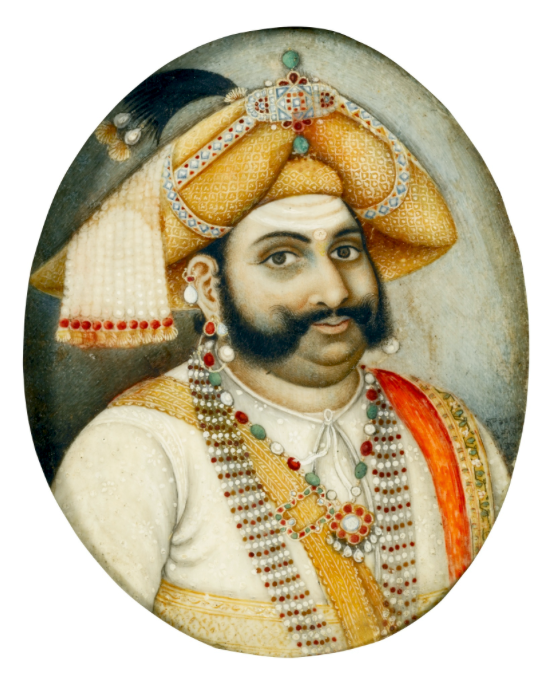
Thanjavur Maratha, published 1874
printed by Rare Book Society of India
Daityaguru Shukra, the Guru of the Asura = generally not a welcome guest in Bhava-9.
Sukha-graha in a bhagya bhava can bring fortune on a material level, and Shukra blesses the Learner with sensual pleasure in ceremonial religion.
Typically, Shukra-9 is raised in a religious tradition which celebrates the feminine, indulges in beautifully crafted ritual implements, gorgeous art and costume, transcendently delicious incense etc.
The five-senses experience in the world of high dharma is lovely indeed --and the better disposed is Shukra, the richer is Shukra-9's sense of pleasure in the temple.
However, Guru's proper business is universal; Shukra's personal attachment to pleasure tends to prevent Guru's wisdom from manifesting in the lovely but earth-bound sacred grounds.
Typical issues include
-
the sensualization of religion (when Shukra is ill-disposed, may result in abuses of sensual pleasuring within the temple )
-
inattention to teachings due to distraction by beautiful costume, music, and scents
-
sensually indulgent or romantic involvement with the guru
-
and a handsome, sweets-loving (including liquid sweets) perhaps promiscuous father whose sensual nature does not uphold the higher principles of philosophical teachings to his children.
When Shukra occupies a rashi of coupling-Budha, can suggest a father's illicit dalliance with Feminine Nativities. Alcoholism or drug addiction in the father or guru, particularly if Shukra = rogesha-6 + randhresha-8 , or ruler-of-12.
Spends mani-money [Shukra] on
-
religious objects (statuary, paintings of religious scenes, beautiful editions of sacred scripture)
-
world travel (including all the accouterments such as luggage)
-
university cultural items (books, pens, instructional media, ceremonial robes)
-
relationships and actions which further one's relationship to priests, professors, and preachers, esp. with women of university or temple quality
Accumulated Treasury from:
-
university teaching and temple preaching
-
the father and father-figures
-
knowledge of religious scripture, priestly culture, and belief systems
Naturally, these traits are modified when additional graha occupy bhava-9 .
Gifts
Selecting a gift for the Shukra-9 Learner?
-
These folk enjoy pleasures of philosophical teaching and sacred culture.
Accouterments of the philosophical life, such as gracious appointments for the priestly or professorial office or other luxurious items of art and music which enhance the refinement of one's wisdom teaching, will be much appreciated gifts.
Delights in the aesthetics of priestly ritual - but unless Budha is strong in radix, this native might not grasp the power or the deeper meanings behind the rituals.
Likes the company of moral philosophers and spiritual teachers .\
Prefers The social and cultural environment of universities, temples, and the international sangha.
-
mani-money may flow from religious temple or university sources (including by donations for sacred teachings); from the third marriage; directly from the father
The Wifely Learner admits a limited number of feminine-friends when Shukra occupies bhava-9.
Lady-friends are financially privileged, world-traveled, highly educated, and expert on humanistic or philosophical subjects.
They are or would be qualified to be professors and priests.
The female counts among her closest lady friends and sisters, not a few scholarly nuns and religious philosophers.
For amy gender, sensual Shukra seeks delicious experiences tending to overwhelm expressions of piety, rather it expresses an attraction to the artistic and musical culture of religious social life; a love of universal philosophy and higher education. Not a devotional position but rather glamorous and sensual, with a rich appreciation of sacred art.
If Shukra empowered - especially in rashi of Budha - the Shukra-9 Learner may support appreciation of art with the professional knowledge of world religious art and music cultures.
Luxurious wealth of religion and wisdom-teachings. Attracted to priest-craft, sacred teachings, guru figures and their worldview; loves the aesthetic ambience of the temple or sthāna of worship, sacred spaces for public ceremony, and the pomp and circumstance of the taking of ritual vows.
Both genders may be attracted to university teaching or scholarly administration (in businesslike rashi e.g. Mithuna or Kanya; also both genders may enjoy world travel, and international education systems (temple network, university network).
Enjoys international culture.
Masjid Sheik of Allah, in Iran
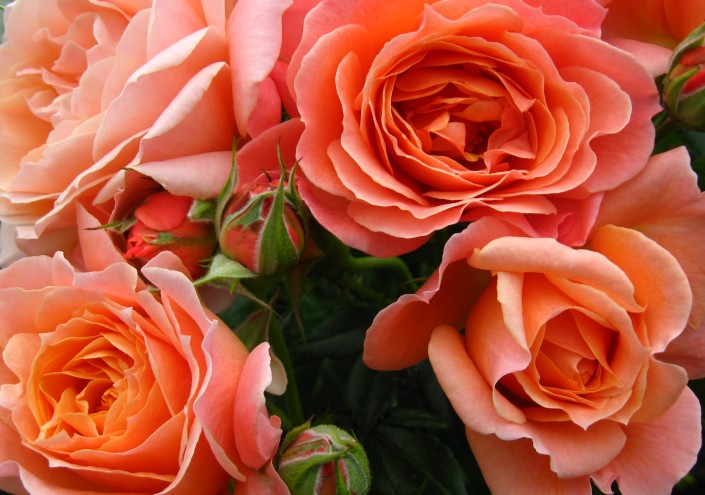
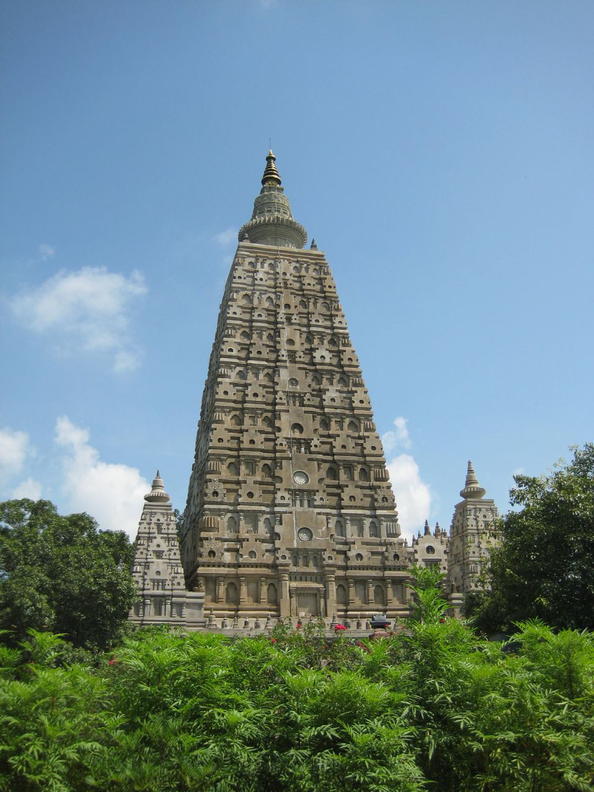
UNESCO World Heritage: Mahabodhi Temple Complex, Bodh Gaya, Nepal
Career during Vimshottari Dasha periods of a graha located inbhava-9 .
Ggraha located in dharmasthāna-9 may confer expansion of humanistic perspective, global awareness, and contact with wisdom-figures.
Nevertheless, the 10th-from-9 = bhava-6 indicating disharmony and ailment.
As a result, there may be a temporary experience of conflict in leadership roles, ailments related to job performance, unfair agreements, loss of contract, dissolution of equity, accusations, pollution, or other 6-related phenomena according to the rashi of 6 and any graha residing in 6.
If the karmesha occupies rogasthāna-6, the professional life remains robust, but the career duties tend to emphasize injury, indebtedness, exploitation, or toxicity, inter alia.
Careers in labor relations, social work, medicine, and other ministries of service are usually enhanced by the 6th-angle because these professions are already dedicated to service of the hurting. Their collegial relationships may temporarily suffer somewhat but the overall mission is stable.

Masjid Siddiqa Fatima Zahra, evening in Kuwait
Image Credit: Matthew Jacob
Aesthetic love and artistic appreciation for religious traditions , temples and practitioners.
-
May develop a special knowledge of and attraction to sacred art and music .
-
Charming philosopher-teacher, attractive in dress and appearance. Sensual, permissive teaching style. Prefers a gentle, relationship-cultivating method of ritual interaction with the spirits. Favored by women. Enjoys beautifying the temple.
-
As Guru of the Demons, shri Shukra = a mortal enemy of Brihaspati, who is the Guru of the Gods. Shukra in bhava-9 lacks respect for ritual hierarchies, grand ceremonies, patriarchal traditions or paternalistic religious behavior.
-
" Daitya-guru" influence may arise through the professors, religious teachers, or the father. They may be profligate or indulge in excessively sensual behavior such as drinking alcohol (Shukra = sugar) or too much enjoyment of women. Favors happiness through religious cultures which hold female sexuality and sensual love in high regard.
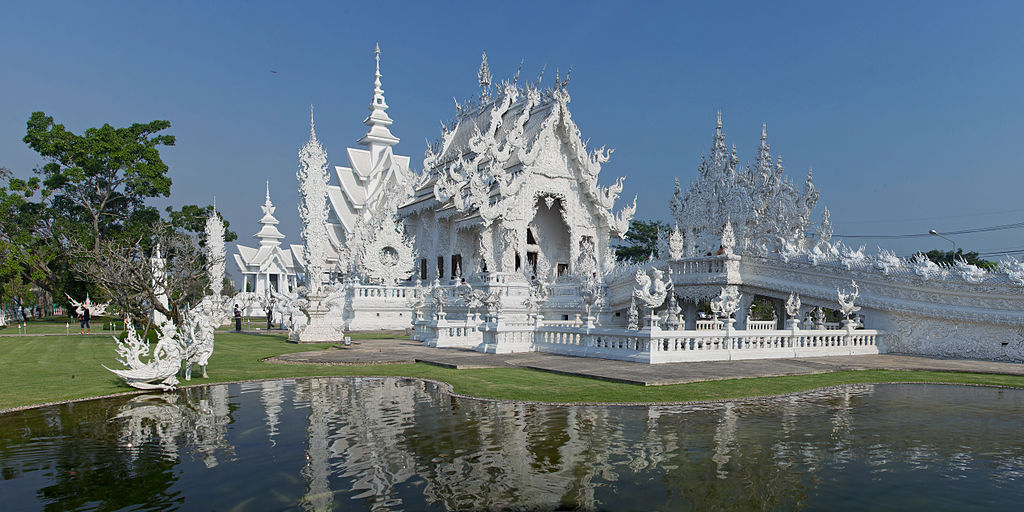
Wat Rong Kuhn Buddhist temple
Chiang Rai, Northern Thailand
Environment of 9, where ones meets feminine partners
- university groups
- international affairs
- philosophy
- world travel
- priesthood, professorship
- scholarship, punditry
- teaching-preaching
- scriptural study
- sacred place, house of worship
Shukra in 9th = 11th from 11th = sangha (sangiti, the reciters) faith community = "the network of networks".
The agent of introduction for the couple = likely to be a friend of a friend = 11th-from-11th
This match-making agent = a philosophically expansive [Guru] person often with a strong sense of religious-cultural art and design. The match-making is often inadvertent. The ostensible reason for the meeting might be rather mundane, for example a motive can be the publishing of philosophical-religious or scholarly texts or making travel plans to visit a sacred place.
Masculine or feminine, the partners in the pairing [Shukra] meet each other in context of
-
university studies and scholarship, especially in sacred scripture or philosophy
-
college and collegial activities, such as taking classes or attending lectures
-
indoctrination, learning the higher principles and theories
-
proselytizing, preaching
-
humanistic world-travel such as study-abroad, educational tour * especially of holy places or temple pilgrimage
-
environments supporting global humanism, such as conferences and seminars on topics of global importance (not local or parochial interests, must have international and optimistic Guru viewpoint)
Also 9th = 5th-from-5th, including political, dramatic, regal, celebrity, entertainment environments - particularly with a global context
In the nativity of a husband
Often, ahusband meets the life-partner [Shukra] in a setting characterized as doctrinal, theoretical, ideological, or philosophical. The setting may be in a temple, university, or environment of global humanism. One in a husband role aesthetically prefers [Shukra] the characteristics of 9 and 9th-from to be displayed by those in the wifely-companion. The life-partner Generally, is interested in philosophical principles and matters of dharma (theories of reality). The wifely-companion either has or aspires to the rarified theoretical discourses of university perspective and global worldview.
One in the husband-role may be attracted to feminine partners who are aware of divinity (literally di-ven the "coming out" of the spirit into the human world). Her principled ideological, theoretical or philosophical commitments are attractive to him, and her wise, inclusive, generous but balanced understanding doctrine may form the basis of their marriage.
A husband with Shukra-9 often cherishes children (9) so that life-partners who are concerned with the divinity and dharma-dogma education of children may seem attractive to the husband-role player.
5th from 5th = dharmasthāna can represent doctrinal drama among the debaters of high religion (in the non-ritual priestly or doctoral realm of divine thought) as well as global humanism on the secular stage.
- in 1912 during a Rahu-Mangala bhukti where Mangala activates 7th-navamsha, Italy-Dictator 1883-1945 Fascist Benito Mussolini met his wife Ida Dasler at a spirited public debate on religion, where at the beginning of the Italian Fascist movement Mussolini took an oppositional stance against the punditry of a group of Christian scholars.

Masjid Raya Medan
Medan, Indonesia
shad-ashtaka 6-8 angles from Shukra = polarizing catalysis areas for alliances
-
relatively little agreement in 6th-from;
potentially illness and conflict
-
secrecy in 8th-from , and potentially catastrophic shock
adversarial, conflicted 6th from Shukra-9 = dhana-bhava-2
- affluence , family lineage values-fulfillment , cintamani * mani * money , store-holds, store-keeping, restoration, storage, stories, conservation, savings, historical knowledge, skandha, shakya, stash, stocks, heaps of stuff, pantry, supplies, Values, herds and hoards , cattle, songs, speech: sensual pleasures, wealth, dematerialization, gathering and collections, banking, food, mouth, teeth , face, eyes, sight, opinions, second spouse, family history , traditions, knowledge, knowledge of languages, oral histories, second marriage
- historical value, shareholder value, production value, investment value
shocking, secret 8th from Shukra-9 = Bandhu bhava-4
- home, mother, maternal culture, caretakers, sheltering, defense, old Ways, customary rhythms,"ethics ", parenting, child-raising, habits of the settled peoples,"ethnicity" , roots, protection of the weak, farming, nourishment, ownership and stewardship of the land, schooling, licensing, vehicles, borders and boundaries, fencing, the sea, marine matters, fish and fishing lifestyle
QUOTATION Das / Bepin Behari
WRT Shukra-9
" ... sensitivity which enables you to vibrate to a higher frequency
-
and learn how to dissolve your self-consciousness by merging it with something else.
-
The object of assimilation may be an ideal for which you fight, agoal you want to achieve, or even the beloved with whom you desire,
but the central theme in all of these is self-forgetfulness, aroused by sensitivity
-
and the desire for union with something sublime , higher than oneself.
You are a money-lender;
all are indebted to you. Grows richer.
-
Religious, charitable, daily distribution of free food; known for piety.
-
Gain through servants, attendants and relatives. Robust.
-
There isn't a man in town who does not take a loan from you. They pay interest and make you richer.
-
Your residence is outstanding.
-
Gain through brothers and physical comforts.
Pious and generous.
You are for a spiritual existence and holiness .
-
Stout, large hearted, blessed with spouse, friends
-
service to preceptor; kind host
-
prosperous; learned; fortunate
-
self-made
-
patrimony for the good of respectable people,
-
festivity, pilgrimage, guests.
Contented, simple living, thin, respected by own community.
-
Wealth gain in 15th year and luck in 25th.
-
Gain of garments.
Calm and balanced, conveyance.
-
Devout, austere, offers adoration,
-
oceanic sign on the feet, enjoyments and sexual pleasure ,
-
blessed with a long living father.
You have a very refined and artistic temperament;
-
intellectual giant for all kinds of intellectual exercises;
-
kind and sympathetic
-
fond of art and music, pure literature,
-
social intercourse with intellectual persons.
-
Success abroad, gain through travel and sea voyage.
Gain
-
through relatives
-
by marriage,
-
marriage to a foreigner,
-
or to one like-minded. "
[end quote]



[How Readings Work] = [Sample Sacred Jewels Ratna Recommendationn] = [Seva]
file update = 18-Jan-2026
 [Copyright © 1994-2024 by Barbara Pijan Lama] =
[Contact] =
[How to Request a Jyotishavidya Reading]
[Copyright © 1994-2024 by Barbara Pijan Lama] =
[Contact] =
[How to Request a Jyotishavidya Reading]
Barbara Pijan Lama Jyotishavidya Vedic Astrology Surya Sun Chandra Moon Mangala Mars Budha Mercury Guru Jupiter Shukra Venus Shani Saturn Rahu Ketu Graha Planets Dasha Timeline Calendar Nakshatra Navamsha Marriage Children Treasury Career Spiritual Wisdom Cycles of re-Death and re-Birth
The information on barbarapijan.com , including all readings and reports, is provided for educational purposes only. Wishing you every happiness and continuing success in studies!
all that is true, all that is noble,
all that is just and pure,
all that is loveable and gracious,
whatever is excellent and admirable -
fill all your thoughts with these things."
~~ Paul of Tarsus, Epistle to the Philippians 4:8
